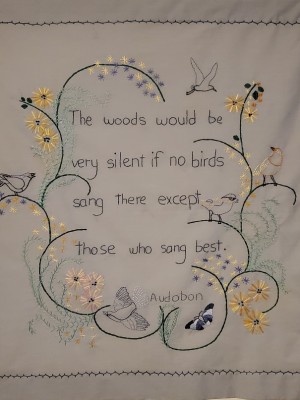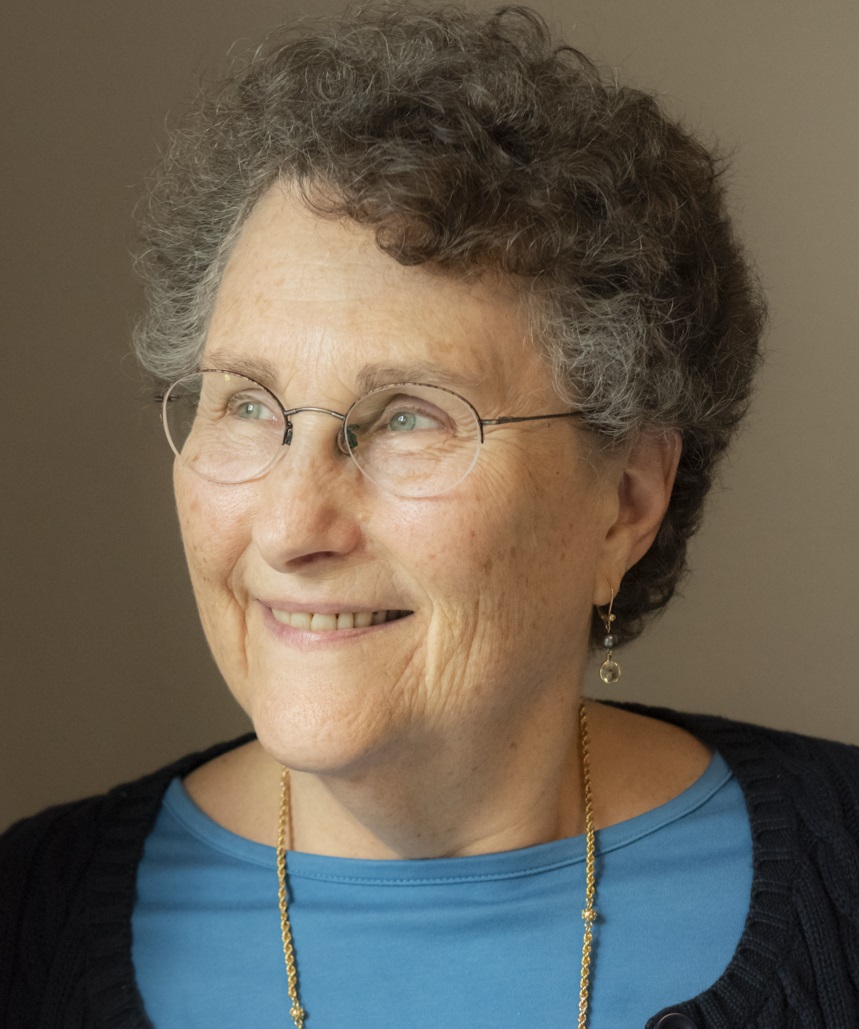Receptivity plus offering my (messy) song to God
Lynne Baab • Thursday January 20 2022

"The woods would be very silent if no birds sang there except those who sang best.”
—John James Audobon
In my journey of letting go of perfectionism, those words from Audobon have had great impact. I came across that quotation about 20 years ago, and about 15 years ago, I embroidered it on a wall hanging that has been in a prominent position in my home for most of the intervening years.
The quotation summarizes so many of the major lessons from the Bible that have shaped me:
Spiritual gifts.As a young adult, I learned about the three major spiritual gifts passages (Romans 12:3-8, 1 Corinthians 12, and Ephesians 4:11-12). Those passages were like fresh water on parched ground, giving names for the beautiful and enriching differences between humans, all of whom reflect God’s image in unique ways. Previously, I had a view that everyone should strive to excel in pretty much the same way. Later, the Myers-Briggs Type Indicator and the Enneagram gave me further helpful vocabulary to describe human differences. I love that my foundation for understanding human differences comes from the three passages in New Testament letters where we have an affirmation that people function and serve God in diverse ways.
The fall of the sparrow.In the midst of his busy teaching and healing, Jesus says four sentences that resonate with all of us who have felt that we simply can’t measure up to the standards held up to us: “Are not two sparrows sold for a penny? Yet not one of them will fall to the ground unperceived by your Father. And even the hairs of your head are all counted. So do not be afraid; you are of more value than many sparrows” (Matthew 10:29-31). So often as a child and young adult I felt like I just didn’t matter, like a small brown bird in huge flock or like one tiny nondescript hair on a head covered with a hundred thousand more hairs. Jesus affirms even when we feel small or imperfect, we are loved. We are valuable.
The women of the Bible.The main characters of the Bible are men, so it’s easy to think we women don’t matter very much. Yet in book after book of the Bible women appear in significant roles, even when only a few words describe them. Ruth and Esther have encouraged so many women to view themselves as valuable, along with the judge Deborah (Judges 4 and 5), the intensely praying Hannah (1 Samuel 1-2), the capable businesswoman of Proverbs 31, the women at the tomb (Mark 16:1-8), the hospitable Lydia (Acts 16:13-15, 40), the teacher and church leader Priscilla (Acts 18:2, 18, 24-28, Romans 16:3-5), the apostle Junia (Romans 16:7), and so many more. Each of them did what they could. None of them gave up on their calling because they couldn’t be perfect. Each of them sang the song God gave them to sing.
I wrote in my previous post that this year I am offering to God my willingness to pursue the good and continue my journey of letting go of the pursuit of the perfect. I loved the podcast by Rob Bell that I quoted from extensively last week, because his perception of good includes messiness, dirt, and wrong turns on the journey. Upon further reflection, Rob Bell’s words reveal to me that I have pretty successfully let go of perfectionism only in one sense. I no longer expect the things I do to be perfect. I shoot for good, or good enough. However, even good or good enough can put me back in a place of bondage, because pursuing good can still include the tyranny of working toward a static goal rather than embracing the process. Rob Bell talked a lot about the discomfort involved in process of fruitfulness: the dirt, mess, wrong turns, and cul-de-sacs. I sense that I am being called to offer to God a willingness to embrace the messiness of the journey as something good.
The messiness of good contributes to the wise use of our spiritual gifts and personality strengths, as we experiment with new things, stumble, pick ourselves up, and move forward with more wisdom. Acceptance of dirt, mess, wrong turns, and cul-de-sacs plays a role in our understanding that yes, we are small like sparrows and hairs, but we have infinite value in God’s eyes whatever happens or whatever we do. The faithfulness of the women of the Bible is not grounded in being perfect in some sort of idealized way. Instead they stepped out in faith, trying to follow God’s path for them no matter how messy the story.
Yes, indeed, the woods would be very silent if the only birds who sang there were the birds who sang best. In 2022, let’s join the chorus of birds and sing our hearts out.
(Next week: Offering God my reasonable hope. Illustration: a wall hanging I designed and embroidered. I love getting new subscribers. Sign up below to receive an email when I post on this blog.)
My book on the Myers-Briggs Type Indicator is called Personality Type in Congregations: How to Work with Others More Effectively.
Some related posts:
- Become what you already are
- Important anniversaries in 2020: Women got the vote
- The Sabbath doesn’t have to be perfect (an interview with me)
Next post »« Previous post
Subscribe to updates
To receive an email alert when a new post is published, simply enter your email address below.

Lynne M. Baab, Ph.D., is a teacher and writer. She has written numerous books, Bible study guides, and articles for magazines and journals. Lynne is passionate about prayer and other ways to draw near to God, and her writing conveys encouragement for readers to be their authentic selves before God. She encourages experimentation and lightness in Christians spiritual practices. Read more »
Lynne is pleased to announce the release of her book on grief and gratitude, designed to help people grieving from anything, including the pandemic, while also desiring to notice God's good gifts. Two Hands: Grief and Gratitude in the Christian Life is available in paperback, audiobook, and for kindle. Lynne's 2018 book is Nurturing Hope: Christian Pastoral Care for the Twenty-First Century, and her best-selling book is Sabbath-Keeping: Finding Freedom in the Rhythms of Rest (now available as an audiobook as well as paperback and kindle). You can see her many other book titles here, along with her Bible study guides.
Lynne recently spoke about empathy and also about bringing spiritual practices to life.
Lynne was interviewed recently for the podcast "As the Crow Flies". The first episode focuses on why listening matters and the second one on listening skills.
Here are two talks Lynne gave on listening (recorded in audio form on YouTube): Listening for Mission and Ministry and Why Listening Matters for Mission and Ministry.
"Lynne's writing is beautiful. Her tone has such a note of hope and excitement about growth. It is gentle and affirming."
— a reader
"Dear Dr. Baab, You changed my life. It is only through God’s gift of the sabbath that I feel in my heart and soul that God loves me apart from anything I do."
— a reader of Sabbath Keeping
Subscribe
To receive an email alert when a new post is published, simply enter your email address below.
Featured posts
- Drawing Near to God with the Heart: first post of a series »
- Quotations I love: Henri Nouwen on being beloved »
- Worshipping God the Creator: the first post of a series »
- Sabbath Keeping a decade later: the first post of a series »
- Benedictine spirituality: the first post of a series »
- Celtic Christianity: the first post of a series »
- Holy Listening »
- A Cat with a Noble Character »
- Welcome to my website »
Tags
Archive
- April 2024 (4)
-
March 2024 (5)
- Friendship, loneliness, and prayer: Praying about distractions from empathy
- Friendship, loneliness, and prayer: Praying to keep empathy flowing
- Friendship, loneliness, and prayer: Everyday initiative
- Friendship, loneliness, and prayer: Praying for guidance for ending conversations
- Friendship, loneliness, and prayer: Reflecting on the series
- February 2024 (4)
- January 2024 (2)
-
December 2023 (6)
- Friendship, loneliness, and prayer: Initiating
- Friendship, loneliness, and prayer: Praying about listening roadblocks
- Friendship, loneliness, and prayer: Praying to love the poverty in our friends
- Friendship, loneliness, and prayer: Praying for “holy curiosity”
- Friendship, loneliness, and prayer: Praying for “holy listening”
- Friendship, loneliness, and prayer: Praying to give affection extravagantly
- November 2023 (4)
-
October 2023 (5)
- Friendship, loneliness and prayer: A listening skill with two purposes
- Friendship, loneliness, and prayer: Saying “thank you” to friends
- Friendship, loneliness, and prayer: One more way reflecting helps us
- Friendship, loneliness, and prayer: Lessons from two periods of loneliness
- Friendship, loneliness, and prayer: Types of reflecting, a listening skill
- September 2023 (4)
- August 2023 (4)
- July 2023 (5)
- June 2023 (3)
- May 2023 (6)
- April 2023 (4)
- March 2023 (4)
- February 2023 (4)
- January 2023 (4)
- December 2022 (5)
- November 2022 (1)
- October 2022 (5)
- September 2022 (5)
-
August 2022 (6)
- Draw near: Confessing sin without wallowing
- Draw near: A favorite prayer about peace, freedom, and much more
- Drawing near with Desmond Tutu: God’s love is the foundation for prayer
- Draw near: Worshipping God with Desmond Tutu
- Draw near: Yearning, beseeching and beholding with Desmond Tutu
- Draw near: Praising God with Desmond Tutu
- July 2022 (2)
- June 2022 (6)
- May 2022 (5)
- April 2022 (6)
- March 2022 (5)
- February 2022 (4)
- January 2022 (3)
- December 2021 (5)
- November 2021 (4)
- October 2021 (5)
- September 2021 (4)
- August 2021 (4)
- July 2021 (4)
- June 2021 (4)
- May 2021 (4)
- April 2021 (5)
- March 2021 (4)
- February 2021 (4)
- January 2021 (4)
- December 2020 (5)
- November 2020 (3)
- October 2020 (5)
- September 2020 (4)
- August 2020 (4)
- July 2020 (5)
- June 2020 (4)
-
May 2020 (4)
- Spiritual diary of sheltering in place: The lifeline of separating thoughts from feelings
- Spiritual diary of sheltering in place: The lifeline of welcoming prayer
- Spiritual diary of sheltering in place: a kite string as a lifeline
- Spiritual diary of sheltering in place: The lifeline of God’s distant future
-
April 2020 (7)
- Spiritual diary of self-isolation: the lifeline of God’s constancy
- Spiritual diary of sheltering in place: The lifeline of accepting my place as a clay jar
- Spiritual diary of sheltering in place: the lifeline of memories
- Spiritual diary of sheltering in place: the lifeline of “Good” in “Good Friday”
- Spiritual diary of sheltering in place: The lifeline of “easier does not mean easy”
- Spiritual diary of sheltering in place: The lifeline of nature
- Spiritual diary of sheltering in place: the lifeline of God’s voice through the Bible
-
March 2020 (7)
- Important anniversaries in 2020: The first Earth Day in 1970
- Important anniversaries in 2020: Florence Nightingale was born in 1820
- Spiritual diary of self-isolation: Weeks 1 and 2
- Spiritual diary of self-isolation: God's grace as a lifeline
- Spiritual diary of self-isolation: The lifeline of limits on thoughts
- Spiritual diary of self-isolation: Wrestling with God for a blessing
- Spiritual diary of self-isolation: responding to terror by listening to Jesus voice
- February 2020 (4)
- January 2020 (5)
- December 2019 (4)
- November 2019 (4)
- October 2019 (5)
- September 2019 (4)
- August 2019 (5)
- July 2019 (4)
- June 2019 (4)
- May 2019 (5)
- April 2019 (4)
- March 2019 (4)
- February 2019 (4)
-
January 2019 (5)
- Nurturing friendships in a cellphone world: Jesus as Friend
- Nurturing friendships in a cellphone world: Friendship with Christ and friendship with others
- Nurturing friendships in a cellphone world: Who is my neighbor?
- Nurturing friendships in a cellphone world: Friendship as action
- Nurturing friendships in a cellphone world: Hymns that describe friendship with God
- December 2018 (3)
-
November 2018 (5)
- Connections between the Bible and prayer: Sensory prayer in Revelation
- First post in a new series: Nurturing friendships in a cellphone world
- Nurturing friendships in a cellphone world: Strong opinions and responses
- Nurturing friendships in a cellphone world: My conversation partners about friendship
- Nurturing friendships in a cellphone world: Two views about communication technologies
- October 2018 (4)
- September 2018 (4)
-
August 2018 (5)
- Providing Christian Care in Our Time
- Providing Christian care in our time: Seven trends in pastoral care today
- Providing Christian Care in Our Time: Skills for Pastoral Care
- Providing Christian care: The importance of spiritual practices
- First post in a new series: Connections between the Bible and prayer
- July 2018 (4)
- June 2018 (4)
- May 2018 (5)
- April 2018 (4)
- March 2018 (5)
- February 2018 (4)
- January 2018 (4)
- December 2017 (5)
- November 2017 (4)
- October 2017 (4)
- September 2017 (5)
- August 2017 (4)
- July 2017 (4)
- June 2017 (4)
-
May 2017 (5)
- My new spiritual practice: Separating thoughts from feelings
- My new spiritual practice: Feeling the feelings
- My new spiritual practice: Coping with feelings that want to dominate
- My new spiritual practice: Dealing with “demonic” thoughts
- My new spiritual practice: Is self-compassion really appropriate for Christians?
- April 2017 (4)
- March 2017 (5)
- February 2017 (4)
- January 2017 (4)
- December 2016 (5)
- November 2016 (4)
- October 2016 (4)
- September 2016 (5)
- August 2016 (4)
- July 2016 (4)
- June 2016 (4)
- May 2016 (5)
- April 2016 (4)
- March 2016 (5)
- February 2016 (4)
- January 2016 (4)
- December 2015 (4)
- November 2015 (4)
- October 2015 (5)
- September 2015 (4)
- August 2015 (4)
- July 2015 (4)
- June 2015 (4)
- May 2015 (4)
- April 2015 (6)
- March 2015 (4)
- February 2015 (4)
- January 2015 (4)
- December 2014 (5)
- November 2014 (4)
- October 2014 (4)
- September 2014 (4)
- August 2014 (5)
- July 2014 (4)
- June 2014 (7)





















